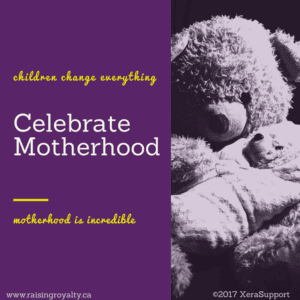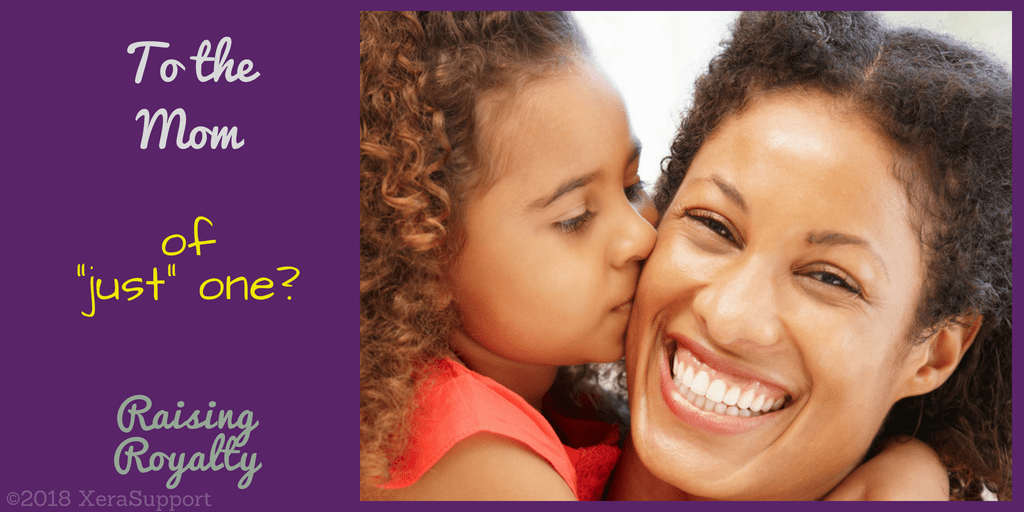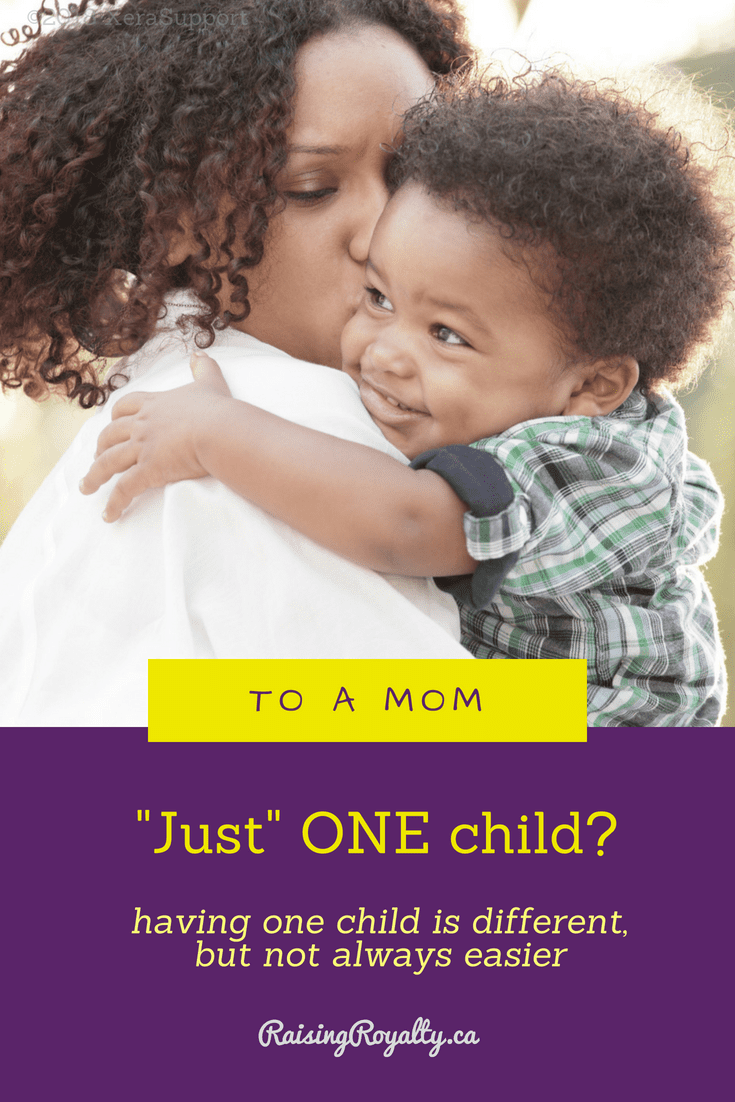I was once where you are, with just one child.
For four years, I had a delightful, aggravating, adorable and annoying little girl, all to myself. It was just her and me, and I didn’t know if I was going to have any more.
Being a mom of one, no matter what your reason, comes with a lot of baggage. There’s a ton of good points to having one child. It also comes with a few frustrations, and some painful situations to deal with.
Having just one child made life with kids much easier.
One child isn’t hard to pick up and go places. These days, when I leave the house with my brood of 6, I often feel like I’m packing for a week long trip, not just a few hours. With just one, even if you need a diaper bag, it’s smaller. There were days I could get away with my purse and a diaper stuck in my back pocket!
One child means that kid-life doesn’t have to take over your life. Getting babysitter for one child is much easier than for more than one. The toys can be hidden away and the clothes can be contained (unless you have super generous grandparents…). With one child, your choices of accommodations and transportation are much greater than with many. You can easily fit one child’s car seat in a small car, and you can get away with a one bedroom apartment for a while. As soon as you have another child, you need to upgrade a lot of those things.
With one child, there’s a lot of direct one-on-one time. I got to spend a lot time with my daughter, just reading stories, directly teaching and modeling things, and enjoying her. These days, while I can still spend time one-on-one with each of my girls, I have less time to go around. And even our one-on-one time can often be interrupted.


An only child often relies on mom and dad for playmates and companionship.
And sometimes, that’s inconvenient and annoying for mom. But at the same time, that only child learns independence and resilience. They have to learn to play by themselves, because mom can’t always play with them. They learn that they are ok, on their own, and often will develop rich, creative, imaginative play.
My only child matured fairly quickly, even though she was so young. Many people commented on her vocabulary and understanding. It only made sense that she had a more developed vocabulary younger. She had only an adult for the majority of her language development and behaviour modeling. (And I refused to use baby talk!). Only children rely heavily on their adults, where children with siblings will copy their siblings as well as their adults — with mixed results.
One of the best things about having “just” one child is the ability to develop a close relationship.
It’s different than when you have more than one child. Having an only child means that you can develop the kind of relationship that turns into a lifelong friendship, when they grow up. Your only child depends on you now as a playmate, but spending that time means they will return the favor when you’re both older.
Notice that I say “just” one with the word just in quotations. Just one is often taken to mean it’s less work, less trouble, some how less hard than having more than one child. And as I pointed out before, in some sense, it is. However, “just” one is not less difficult than more than one child. In a lot of ways, its more. You’re their sole source of entertainment, education, and companionship. An only child depends on their parents much more than children with siblings. And that can be draining.
Just one child is not any easier.
And you’re not any less of a parent for only having one child, whether by choice or by chance. It’s just a different mindset, and a different way of parenting than those of us with more than one have. But no two parents are the same, anyway.
How do you develop a relationship with your only child?
First, focus on them.
With more than one child, being able to focus on one thing or person for any length of time gets harder, just for logistical reasons. But with only one child, you can focus on them for a longer amount of time. Heck, you can focus on anything for a longer amount of time! But set aside the time to focus on your child.
Invite them into your world. You don’t have to focus on what they’re doing, but you can focus on them while they join you in what you’re doing. Shared experiences and interests are what create the foundation for a long-lasting relationship. Have them join you when you’re cleaning up, cooking, or any of the other mundane tasks of running a home. Even better, have them join you when you’re having fun, even if that’s as simple as sharing the video on Facebook that amused you. They may not always get the joke, but they’ll remember you sharing with them.
Second, foster that relationship with them.
It’s not enough to just spend time with them, but you have to pay attention to them too. Often its easy for us adults to get bored of our children’s games, and we start thinking of what’s next on our to-do list, or we pick up our phone and check out. But when you pay attention, you can learn all sorts of things about your child. And you won’t miss all those teachable, shareable moments.
It’s in fostering that the inside jokes, the memories and the emotional connection is created. One of my favorite memories of my daughter, when she was my only child, is the funny way she would mispronounce words. We have several phrases for things that are just for us, because of that. I don’t have as many of those with my other children. They were too quickly corrected by older siblings to develop those childish phrases that become family funnies.
Finally, mentor your child.
Make a direct effort to teach them something. When they ask the hard, embarrassing questions, answer them, at their age level. If they ask you about your past experience, share it, as much as is appropriate, even if you’d rather not remember it. And if you don’t know the answer, tell them that too. Being honest about your failings, your values, and your own limits will build trust. And trust is the key to a good relationship.
Mentoring is more than just teaching. It’s modeling too. And when you have one child, they are much more focused on you. Take advantage of that focus, by modeling your beliefs and values. Offer the advice and encouragement they need when they are trying something new. Hold them accountable to what they say.
All of these seem just like parenting 101, right?
But with one child, you can focus, foster and mentor your child in a way that I can’t, having more than one child. Parenting one child gives different opportunities. And that’s a good thing.



My husband and I have currently been struggling with the decision to expand our family beyond one child. I loved the perspective you were able to give. Thanks for the great post! #BlogCrush
Thank you! I hope it helped you feel better about your decision, whichever way you went. There’s no shame in choosing to have only one child, and there’s no shame in choosing to have more.
I definitely agree that parenting one child doesn’t mean your life is easy but things definitely do get more difficult when a sibling comes along. The one on one time with your first is something that can never be repeated with your subsequent children, there just aren’t enough hours in the day and your eldest will stil need your time and attention too. Decided to have more kids is a personal thing and no one should feel bad for having ‘just’ one child xx #BlogCrush